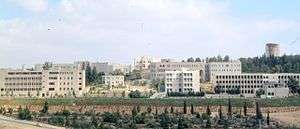Birzeit University
| جامعة بيرزيت | |
 | |
| Motto | Building a Better Palestinian Future |
|---|---|
| Type | Public |
| Established | 1924 |
| President | Abdul Latif Abu Hijleh |
Academic staff | 617 |
| Undergraduates | 8,465 |
| Postgraduates | 1,388 |
| Location | Birzeit, Palestine |
| Campus |
Urban 800 dunums (200 acres) |
| Affiliations | UNIMED |
| Website | www.birzeit.edu |
 | |
Birzeit University (Arabic: جامعة بيرزيت), often abbreviated as BZU, is a non-governmental public university located in Birzeit, Palestine, near Ramallah. Established in 1924 as an Elementary School for girls, Birzeit became a University in 1975 .[1]
Birzeit University, with the highest admission averages among other Palestinian universities, offers graduate and undergraduate programs in information technology, engineering, sciences, social policy, arts, law, nursing, pharmacy, health sciences, economics, and management. It has 9 faculties, including a graduate faculty. These offer 47 B.A. programs for undergraduate students and 26 M.A. programs for graduate students.[2]
History

Birzeit School for Girls was founded in 1924 by Nabiha Nasir (1891-1951) as an elementary school for girls from Birzeit and the surrounding villages. It was one of the first schools in the region. In 1930, it broadened its scope to become a co-educational secondary school, and in 1932, it was renamed Birzeit Higher School. In 1942, the name was changed to Birzeit College. In 1953, a freshman higher education class was incorporated, followed by a sophomore class in 1961.[1]
The year 1948 was a turning point in the history of Birzeit College. By the spring, the political situation looked precarious, and Birzeit administrators worried that the school year which normally ended in June would be interrupted by events connected with the withdrawal of British forces and the end of the British Mandate lasting since 1917. The administrators decided to complete the semester curriculum by April, scheduling the graduation ceremony for April 30, 1948 and to be held under the auspices of Abd al-Qadir al-Husayni, the chief commander of the Army of the Holy War. However, he was killed on April 8 at the battle of Al-Qastal by the Jewish paramilitary force Haganah, who were defending positions on that hill on the outskirts of Jerusalem.
In 1975, Birzeit College changed its name to Birzeit University. In April 1976, Birzeit University was accepted as a member of the Association of Arab Universities. University president Hanna Nasser was deported by Israel in 1974. He was allowed to return in 1993, with the signing of the Oslo accords as part of the peace process.
The university was closed from 1988 until 1992 by the Israeli army saying "they were nests of anti-Israeli violence". The university was the last of 6 in Israeli occupied territories to reopen.[3]
Board of Trustees
Birzeit University is governed by an autonomous Board of Trustees composed of educators and professionals from the Palestinian community. The board appoints the president of the university. It also confirms the appointment of vice-presidents and deans upon the recommendation of the president. The board approves the budget and general development plans presented to it by the university council.
Administration
The university follows a semester system, with two four-month semesters beginning in Autumn and Spring, and shorter two-month two semesters in summer. Support comes from numerous Palestinian, Arab, and international foundations, as well as from various individuals.[4]
Faculties
Through Its nine faculties, including the Graduate Faculty, Birzeit University offers a wide range of graduate and undergraduate programs in various fields, where students can choose from 47 Bachelor of Arts programs and 26 Master of Arts programs. Each faculty is constituted from several academic departments that offer specialized courses in all fields. In addition to majors, interested students who want to pursue an extra set of courses in areas other than their majors can be enrolled in minor courses.
Although the official language of instruction is Arabic, the university offers several courses in English. The educational system is based on four semesters - two summer semesters, one fall/winter semester and one spring/summer semester.
Academic profile

New graduate and undergraduate programs in information technology, engineering, sciences, social policy, economics, and management are being developed. The University campus is being expanded. At the same time, Birzeit University's various community Centers and Institutes engage in policy-oriented research to assist in the economic, social and human development of Palestine. The university offers numerous undergraduate and post-graduate degrees through its seven faculties: Arts; Commerce and Economics; Engineering; Nursing-Pharmacy and Allied Health; Sciences; Law and Public Administration; Information Technology; and Graduate Studies.[5]
The Graduate Studies programs offers post-graduate diplomas and master's degrees in the following fields: contemporary Arabic studies; Arabic Islamic history; education; sociology; international studies; democracy and human rights; economics; law; community and public health; water and environmental engineering; water and environmental sciences ; gender, law and development; business administration; applied statistics; scientific computing; urban planning and design; and medical laboratory sciences.[6]
The university also offers two high diplomas in: primary healthcare (supervision and training); and gender, law, and development. In addition to its academic programs, the University has a wide range of institutes, centers, and programs that aim to develop and support the community-oriented programs that contributes to the achievement of sustainable development in Palestine.[4]
The Palestine and Arabic Studies (PAS) Program was established over 20 years ago at Birzeit University. Through PAS, international students benefit from accredited courses in Palestinian history, culture, the Palestine question and the Arabic language.
International Students
Students can take full advantage of the university facilities and interact with local students through clubs, societies, social events and recreational activities. Students can choose from a range of extracurricular lectures and schedule visits to places of historical, cultural and political interest, and volunteer for social projects.
International Summer Work Camp
Since 1981, Birzeit University (BZU) has been organizing International Summer Work Camps, aiming to achieve BZU’s mission, build generations that are open to the world, provide an opportunity for cultural exchange, introduce the Palestinian cause, and reinforce the Palestinian core values of caring, respect, peace, and acceptance of the other. The camps focus on community-oriented volunteer projects in schools, municipalities, and civil society organizations. They introduce participants to several geographical places in the West Bank. The International Summer Work Camps include voluntary work, visits to Palestinian cities, villages and refugee camps, and other Palestinian universities. Furthermore, it provides an opportunity for foreign participants to meet Palestinian families, political and community leaders, as well as Palestinian academics.
Notable people
Currently, there are a number of professors who are also appointed as ministers in the current Palestinian government. Thirteen members of the Palestinian negotiating team in U.S.-sponsored Middle East peace talks were faculty members of Birzeit University. Hanan Ashrawi taught literature there.[3]
The South African-born sociologist Stanley Cohen worked at Birzeit in support of Palestinian staff and students while a Professor in Criminology at the Hebrew University between 1980 and 1996.[7]
References
- 1 2 "About : History". Birzeit.edu. Retrieved 2015-09-30.
- ↑ "Undergraduate Studies". Birzeit.edu. Retrieved 2015-09-30.
- 1 2 Williams, Daniel (1992-04-21). Major Palestinian University to Reopen: Israel: The Birzeit campus on the West Bank will be the last of six closed four years ago to resume operations. LA Times, 21 April 1992. Retrieved from .
- 1 2 "About : Quick Facts". Birzeit.edu. Retrieved 2015-09-30.
- ↑ "Undergraduate Programs". Birzeit.edu. Retrieved 2015-09-30.
- ↑ "Graduate Studies Programs". Birzeit.edu. Retrieved 2015-09-30.
- ↑ Pioneers of Qualitative Research Stan Cohen UK Data Service, funded by the ESRC, Economic and Social Data Service, undated, retrieved 30 September 2015.
External links
- Official site
- Friends of Birzeit University
- The Palestine and Arabic Study Abroad Program at Birzeit
Coordinates: 31°57′31.29″N 35°10′50.54″E / 31.9586917°N 35.1807056°E